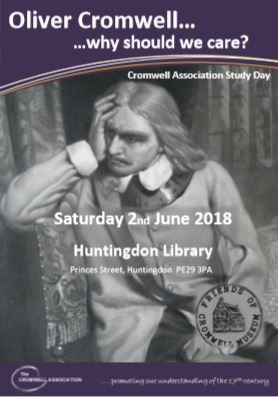Venue: Huntingdon Library, Princes Street, Huntingdon, PE29 3PA
Date: Saturday 2nd June 2018

A back to basics study day with expert speakers looking at Cromwell’s career and why it is important and worth studying. The morning will have four contributions looking at different aspects of Cromwell, and will be followed by a chaired panel discussion, with the opportunity to ask questions. Whether you are relatively new to Cromwell studies or have a life-long interest, this event will be an interesting and stimulating day.
The Association is running this event in conjunction with the Friends of the Cromwell Museum and all profits from the day will go to the Friends to help support the Cromwell Museum in Huntingdon.
- 10.15 – Registration
- 10.30 – Welcome & housekeeping chair of Friends Angela White-Horan
- 10.35 – Introduction by chairman of the Cromwell Association John Goldsmith
- 10.45 – Cromwell in the 1630s: old evidence and new connections– Andrew Barclay
- 11.15 –’Ironsides in the Making’: the early military career of Oliver Cromwell, 1642-43 – John Sutton
- 11.45 – Coffee break
- 12.00 –Regicide, Republic and Protectorate (1646-58) Jon Fitzgibbons and David L Smith
- 13.00 – Lunch
- 13.45 – Panel discussion with all four speakers chaired by James Batch.
- 14.30 – Questions and answers to the Panel
- 15.00 – Conclusion and final remarks John Goldsmith
- 15.15 – Ends
Cromwell retains his capacity to surprise. New information about him is still coming to light. The speaker will discuss how the process of editing some of Cromwell’s earliest letters, all of which have long been known to historians, has produced several unexpected new leads. Just as recent research has linked Cromwell to networks of the godly in Cambridge, so we can now detect hints of ways in which he was linked to similar godly individuals in London. This also connects back to local politics in Huntingdon. Such new discoveries underline Cromwell‘s status as one of the most endlessly fascinating figures of the seventeenth century.
Dr. Andrew Barclay is a Senior Research Fellow with the 1640-1660 Section of the History of Parliament Trust. He is also one of the editors of the forthcoming OUP edition of Cromwell’s correspondence and speeches.
During the first year of the English Civil War Oliver Cromwell won his military spurs in his ‘own fields’ With his famous regiment of ‘ironsides’, the shock troops of the army of the Eastern Association, he won a string of cavalry victories-at Belton, Gainsborough and Winceby- which kept the region safe for Parliament. Yet paradoxically this relatively obscure East Anglian squire was not only a relatively old man when fighting began-he was in his early forties-but he was also untrained in the arts of war. How then did this greenhorn-soldier with little or no formal military training develop into one of the greatest generals in British history?
John Sutton was formerly a Senior Lecturer in History at Anglia Ruskin University. He is particularly proud of the Anglia television series which he authored in 1983-4 entitled ‘A War in the Kingdom,’ about the civil war in eastern England .During his retirement he has continued to be an active teacher lecturing at home and abroad.
Jon Fitzgibbons will begin the session by focusing on Oliver Cromwell’s political and religious motivations in the period from the end of the First Civil War through to the trial and execution of King Charles I (1646-49). He will explore whether Cromwell was a committed regicide or a reluctant revolutionary. David Smith will then examine Cromwell’s rise to power and his fraught relationship with parliament from 1649 to 1658. In particular, he will explain why Cromwell ultimately failed to rule with parliament or realise his ideal of ‘healing and settling’. Finally, Dr Fitzgibbons will conclude the session by examining whether it is appropriate to style Cromwell as a king in all but name and consider some of the legacies of his reign as Lord Protector, including the succession of his eldest son Richard.
Dr Jon Fitzgibbons is Lecturer in Early Modern History at the University of Lincoln. He has published on the political and constitutional history of the Interregnum and Cromwellian Protectorate and is a Trustee of the Cromwell Association.
Dr David L. Smith is Fellow, Director of Studies in History, and Graduate Tutor at Selwyn College, Cambridge. He has published extensively on seventeenth-century British history, and is a former Trustee of the Cromwell Association.
James Blatch is a former BBC News reporter and presenter. He worked principally in the eastern region, but had stints in London and the South. After the BBC James became a film examiner for the British Board of Film Classification, he now runs his own businesses in video production and online courses. He has lived in the Huntingdon area since 1975. He is a keen follower of local history and has appeared on stage three times in local productions which celebrated Cromwell, twice as Samuel Pepys and once as a rump parliament MP!
The cost of the day is £30, with a reduction of £5.00 for members of the Cromwell Association and members of the Friends of the Museum, or volunteers at the Cromwell Museum. (Maximum £5.00 discount per person!) The cost of attendance includes coffee and a light buffet lunch. Places are limited and must be booked in advance. All bookings must be received by Friday 25th May.
Click to download and complete a programme including the manual booking form.
Or book using Paypal or a debit/creidt card
